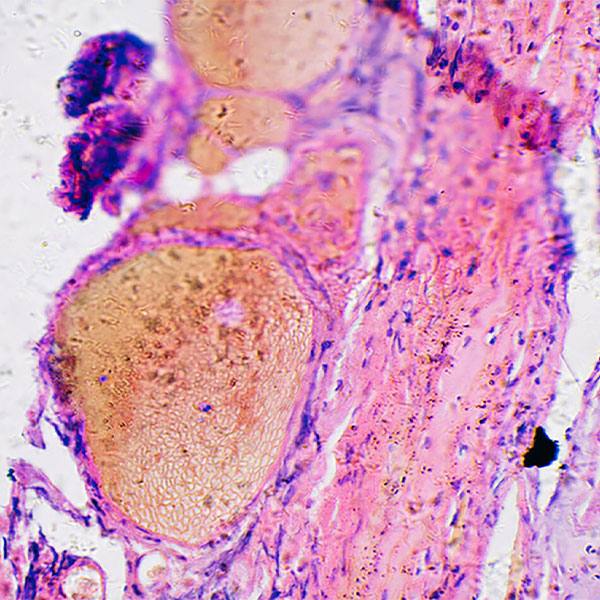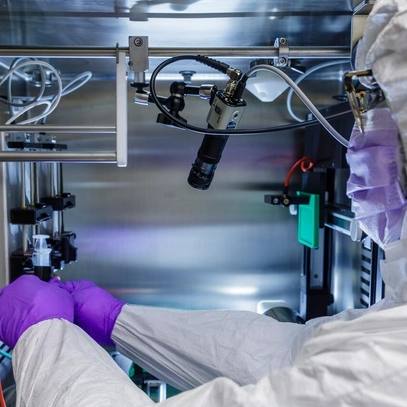-
Research
Mayo Clinic Healthcare expert: Artificial intelligence improves colonoscopy accuracy
James East, M.D., spends his days skillfully examining people’s colons, searching for and snaring away suspicious polyps that might one day turn into cancer. A gastroenterologist at Mayo Clinic Healthcare in London, he says the ability to identify cancer risks and eliminate them on the spot during a colonoscopy is one of the most satisfying parts of his chosen profession.
Colonoscopy remains the gold standard in detecting and preventing colorectal cancer. But the procedure has limitations. Some studies suggest that more than half of post-colonoscopy colon cancer cases arise from lesions that were missed at patients’ previous colonoscopies.
Now researchers at Mayo Clinic are investigating how artificial intelligence can be harnessed to increase polyp detection. In fact, gastroenterologists are engaging AI as a tool to improve care for a wide range of conditions, with the goal of finding elusive signs earlier when the diseases are more treatable.
Like Having Another Expert Looking Over Your Shoulder
In the case of colon cancer, the AI system works alongside the physician in real time, scanning the colonoscopy video feed and drawing small, red boxes around polyps that might otherwise get overlooked. "We’re all familiar with facial recognition software," says Dr. East. "Instead of training the AI to recognize faces, we train it to recognize polyps."

Colon cancer is the second deadliest cancer worldwide; in the U.S. alone, it caused an estimated 53,000 deaths in 2022. The last few decades have seen a steady rise in colorectal cancer rates among younger people, prompting the American Cancer Society to lower the recommended age for screening from 50 to 45. Even though colonoscopy can be an effective screening tool, Dr. East says there is variability in how well endoscopists find precancerous polyps.
But adding AI to a traditional colonoscopy could improve the outcomes. Michael B. Wallace, M.D., is a gastroenterologist at Sheikh Shakhbout Medical City in Abu Dhabi, a hospital operated in partnership with Mayo Clinic in the United Arab Emirates, and at Mayo Clinic in Florida. As a researcher with Mayo Clinic Comprehensive Cancer Center, he's been studying the technology and its ability to improve care. "It’s like having another expert looking over your shoulder, helping you all along the way," he says.
In 2022, Dr. Wallace published the results of an international, multicenter study testing the impact of adding AI to routine colonoscopies. His team, which included Dr. East as well as researchers from the U.S., the U.K., Italy, Germany, and Ireland, found that incorporating AI into colonoscopies reduced the risk of missing polyps by 50%.
"AI, particularly the subset of AI called computer vision, is naturally suited to what we do through the endoscope," says Dr. Wallace, who describes himself as a bit of a technology geek. The FDA approved the first AI system for polyp detection, and many more will likely follow. Dr. East believes that this kind of AI technology is so straightforward, and achieves such superior results, that it will become the standard of care within the next five years.
Tracking Down the Subtlest Polyps
Ironically, polyps are hardest to spot in patients who are most in need of screening. Patients with inflammatory bowel diseases (IBD) like Crohn’s disease or ulcerative colitis are at high risk of colorectal cancer. But the pre-cancerous lesions they develop tend to be flat or only slightly raised, unlike the bulbous mushroom-shaped polyps seen in people without IBD.
"Most people that develop these cancers are undergoing regular colonoscopies, and the lesions still get missed because the tumors are very subtle," says Nayantara Coelho-Prabhu, M.B.B.S., a gastroenterologist at Mayo Clinic in Minnesota.
Dr. Coelho-Prabhu believes that AI could be trained to track down deceptively innocuous-looking polyps. "Mayo Clinic is uniquely poised to take on this type of research," she adds. "We conduct surveillance colonoscopies in 800 to 900 IBD patients a year. As a result, we have accumulated a huge databank we can use to develop the AI systems needed to improve how we do colonoscopies for these patients."
That databank provides what Dr. Coelho-Prabhu and other experts call "ground truth," the real-world observations and measurements used to train and test AI algorithms. Her team is currently annotating data from a subset of 1,000 patients, watching one colonoscopy video after another and marking lesions in every frame, from every angle. After the images are annotated, the researchers will feed them to a computer to generate the type of AI "machine learning" algorithms that enable the machine to learn how to recognize IBD-specific polyps on its own.
Dr. Coelho-Prabhu, gastroenterologist Cadman Leggett, M.D., and colleagues are pioneering a new digital endoscopy platform that will film all in-house procedures, correlate them with medical records, and then integrate AI back into the procedures as applicable. "Once we develop algorithms, we can run them in our procedure videos to test their performance," she says.
Intercepting Other Cancers Early to Save Lives
Even though the most mature applications of AI in gastroenterology have focused on the colon, researchers are also looking at ways to apply the technology to cancer detection in other parts of the digestive tract. Gastroenterologist Shounak Majumder, M.D., has helped to establish the Mayo Clinic GI AI Lab, known as GAIL, which is bringing together clinicians, engineers, and data scientists to identify gaps in the field and devise AI solutions to fill them. "Digital innovation is an important part of our overall strategic plan to foster innovation in the division and develop new solutions for, and new ways to connect with, our patients," says GI division chair Darrell Pardi, M.D.
Novel AI-assisted tools can also enable early detection of diseases such as liver disease and cirrhosis. For example, gastroenterologists Doug Simonetto, M.D., and Alina Allen, M.D., of the Mayo Clinic Data Analytics and AI for Advanced Liver Disease Laboratory recently used machine learning methods to analyze ECG scans for subtle shifts in the electrical activity of the heart associated with cirrhosis. Their findings show how AI can identify irregularities in relatively routine medical tests that might signal something is amiss.
Dr. Majumder has set his sights on pancreatic cancer, a disease projected to surpass colorectal cancer in cancer-related deaths by the year 2030. "Only about 10% of patients with pancreatic cancer survive five years after diagnosis," he says. "It is always the same story — patients go from feeling fine and healthy to realizing they have no more than six months to live. When the cancer is intercepted at an early stage, patients live longer. That really drew me to the idea of early detection."
Dr. Majumder is tapping a branch of AI known as natural language processing (NLP) to identify people at high risk of developing pancreatic cancer. NLP enables computers to sort through clinical notes and electronic health records and interpret them in an objective manner. "If you have certain risk factors — a family history of the disease, specific genetic variants, or a diagnosis of diabetes — you are eligible for pancreatic cancer screening. But patients and physicians don’t always make those connections," says Dr. Majumder. He is leading a team that is developing and testing NLP algorithms to identify patients with risk factors so they can be offered screening appropriately.
In collaboration with radiologists within the Mayo Clinic Pancreatic Cancer Early Detection Research Program, he also is enhancing imaging tools to detect cancer at an early stage in those who are at high risk. In Gastroenterology, the team showed that AI machine learning algorithms could examine CT scans and detect “hotspots” — imperceptible to the human eye but indicative of pancreatic cancer — 3 to 36 months before clinical diagnosis. Though the findings need to be confirmed in a larger, multi-center study, Dr. Majumder says they may provide a path to identify the disease at an early stage: “The idea is not only to identify who has cancer now but to be able to predict who will develop cancer in the future.”
—Marla Broadfoot, Ph.D.
Related Articles











